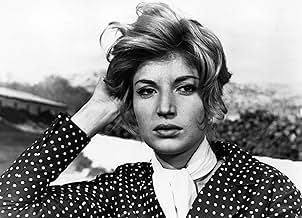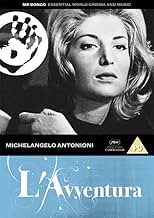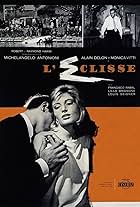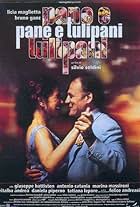A woman disappears during a Mediterranean boating trip. During the search, her lover and her best friend become attracted to each other.A woman disappears during a Mediterranean boating trip. During the search, her lover and her best friend become attracted to each other.A woman disappears during a Mediterranean boating trip. During the search, her lover and her best friend become attracted to each other.
- Nominated for 2 BAFTA Awards
- 6 wins & 12 nominations total
Prof. Cucco
- Ettore
- (uncredited)
Storyline
Did you know
- TriviaAt its premiere at the 1960 Cannes Film Festival, this was booed so much to the extent that Michelangelo Antonioni and Monica Vitti fled the theater. However, after the second screening there was a complete turn around in how it was perceived and it was awarded the Special Jury Prize, going on to become a landmark of European cinema.
- GoofsWhen Sandro and Gloria make love, her nipple is unintentionally revealed and she quickly hide it.
- ConnectionsEdited into Histoire(s) du cinéma: Seul le cinéma (1994)
- SoundtracksMai
(uncredited)
Written by Silvana Simoni (as Simoni), Aldo Locatelli (as Locatelli), Arturo Casadei (as Casadei), and Aldo Valleroni (as Valleroni)
Performed by Mina
[sung along to by Monica Vitti]
Featured review
Many of the post-war new wave European directors seemed to have problems making "American Films" that addressed US concerns. Today the distinction no longer arises, media globalisation/colonization being almost complete. But while Antonioni's "Zabriskie Point" was a weak attempt at "portraying America", his previous films have become only more relevant, working as effective portraits of very specific modern conditions.
Unlike the neorealist films that he was reacting against, Antonioni's major films don't portray any working class alternatives to the lives of the bourgeoisie. Instead, his films induce a kind of paralysis. They have a noxious and toxic quality, which his characters experience and his audience is forced to share. This paralysis is itself the consequence of what happens when gender stratification and class domination are pushed to the extreme points that they are in a medium-late capitalist society. In other words, Antonioni's internal suffering, his existential nausea, is the precise "subjective" consequence of an "objective" regime of accretion for its own sake.
Antionioni's cinema embalms the viewer in a sort of suffocating subjectivity, until we feel nothing but the neuroticism, narcissism, and cataclysmic disinterest of his characters. And yet, his camera constantly forces us into a distant, almost inhuman, position. It is this strange juxtaposition between an inhuman, almost anthropological distance, and a subjectivity so suicidally sickening, that makes Antonioni's films so unique.
More importantly, it is because of this internal malaise, that Antonioni's characters are constantly on the run. One of man's greatest flaws is his incessant belief that some external flight is capable of inducing some meaningful state of internal happiness. That by retreating to another location, man's problems may disappear. That by superficially changing his environment, escaping to a fantasy world, indulging in physical pleasures or acquiring and accumulating material objects, man may finally be at peace. But time and time again, Antonioni reveals these tactics to be nothing more than temporary distractions.
As such, Antonioni's characters seem to fall into two categories. His Italian trilogy (and Red Desert), for example, focuses on wealthy characters who haven't a financial care in the world. If we think in terms of Maslow's hierarchy of needs, then this is a group of people whose requirements - financial, physiological, social or otherwise - are always amply met. But it is precisely because their needs are met, that these characters are trapped in a state of contemplation. They are free to think. And it is precisely this freedom which brings about a painful sort of super-awareness. Rather than struggle to survive, they question their own survival. And so they suffer from self-imposed loneliness, from an inability to connect with other people except on the most superficial level (they stage shark attacks and bouts of sex for quick thrills), and from, not frustration so much as anhedonia, an inability to take pleasure, and also, more shockingly, an inability even to have dreams or desires.
While Antonioni's "wealthy characters" now work as apt stand-ins for post-modern man, for every man and woman in the developed world, Antonioni's English-language films tend to focus on photographers and radicals. That is, they are artists and voyeurs, outside of both paralysis and capitalist logic. They seek to escape their identities, live free on the margins of society, or bring about some social disruption or even revolutionary action. But again, there is no solution. Antonioni's filmography never resolves the problems he tackles.
Unique with Antonioni is the way his characters fail to comfortably inhabit the spaces in which they exist. Antonioni's characters always seem to be in an awkward relationship with their personal environments. They slide within vacant houses, are suffocated by industrial wastelands, search ragged islands, and though they dream of blissful beaches or utopian deserts, there is no escape, only an ever-expanding landscape of paralysis.
And within these spaces, all Antonioni's drama is internal. Antonioni's cinema is a cinema of inaction. Nothing external happens. Instead, we witness the immense tiredness of the human body. We witness the outcome of some unseen drama and the result of some long past trauma. Watch how Antonioni begins his films with relationships, not only long established, but already dissolved. These characters carry the burdens of a complete past history. A history forever unknown to us. Think of "The Passenger" which begins with Jack Nicholson already lost and in the wilderness, or "The Eclipse", which begins with lovers breaking up.
In a sense, Antonioni also predicts the after-glow of the Sexual Revolution. He portrays a universe dominated by the superego injunction "to enjoy". Pleasure is the goal, but partaking in such pleasures, now readily accessible with the collapse of religion, culture and morality, only lead to a callous indifference to pleasure itself. And so we have a desensitisation to pleasure: an inability to find gratification in money, love, ideology or objects.
Monica Vitti, Antonioni's beautiful leading lady, thus becomes a symbol for this dissatisfaction. Antonioni objectifies Vitti, treats her as a pillar of sex and beauty, an object of temptation and ripe possibility, yet simultaneously portrays her as a disinterested and disaffected zombie. Love cannot flourish without sex, but love is impossible precisely because of sex. Sex is thus, to put it in Zizekian terms, simultaneously the condition of the possibility and the impossibility of love.
Unsurprisingly, as we begin the 21st century, the problems faced by Antonioni's middle-aged characters seemed to have been transferred to an even younger generation. Indeed, if Antonioni were making films today, his characters would probably be in their late teens. Perhaps this is why today's younger viewers (the very viewers who would benefit most from his films) find it hard to identify with Antonioni's films. Perhaps what we need is an Antonioni of the 21st century. A younger, hipper Antonioni. The kind of Antonioni that Antonioni tried to be with "Zabriskie Point".
8.5/10 - Masterpiece.
Unlike the neorealist films that he was reacting against, Antonioni's major films don't portray any working class alternatives to the lives of the bourgeoisie. Instead, his films induce a kind of paralysis. They have a noxious and toxic quality, which his characters experience and his audience is forced to share. This paralysis is itself the consequence of what happens when gender stratification and class domination are pushed to the extreme points that they are in a medium-late capitalist society. In other words, Antonioni's internal suffering, his existential nausea, is the precise "subjective" consequence of an "objective" regime of accretion for its own sake.
Antionioni's cinema embalms the viewer in a sort of suffocating subjectivity, until we feel nothing but the neuroticism, narcissism, and cataclysmic disinterest of his characters. And yet, his camera constantly forces us into a distant, almost inhuman, position. It is this strange juxtaposition between an inhuman, almost anthropological distance, and a subjectivity so suicidally sickening, that makes Antonioni's films so unique.
More importantly, it is because of this internal malaise, that Antonioni's characters are constantly on the run. One of man's greatest flaws is his incessant belief that some external flight is capable of inducing some meaningful state of internal happiness. That by retreating to another location, man's problems may disappear. That by superficially changing his environment, escaping to a fantasy world, indulging in physical pleasures or acquiring and accumulating material objects, man may finally be at peace. But time and time again, Antonioni reveals these tactics to be nothing more than temporary distractions.
As such, Antonioni's characters seem to fall into two categories. His Italian trilogy (and Red Desert), for example, focuses on wealthy characters who haven't a financial care in the world. If we think in terms of Maslow's hierarchy of needs, then this is a group of people whose requirements - financial, physiological, social or otherwise - are always amply met. But it is precisely because their needs are met, that these characters are trapped in a state of contemplation. They are free to think. And it is precisely this freedom which brings about a painful sort of super-awareness. Rather than struggle to survive, they question their own survival. And so they suffer from self-imposed loneliness, from an inability to connect with other people except on the most superficial level (they stage shark attacks and bouts of sex for quick thrills), and from, not frustration so much as anhedonia, an inability to take pleasure, and also, more shockingly, an inability even to have dreams or desires.
While Antonioni's "wealthy characters" now work as apt stand-ins for post-modern man, for every man and woman in the developed world, Antonioni's English-language films tend to focus on photographers and radicals. That is, they are artists and voyeurs, outside of both paralysis and capitalist logic. They seek to escape their identities, live free on the margins of society, or bring about some social disruption or even revolutionary action. But again, there is no solution. Antonioni's filmography never resolves the problems he tackles.
Unique with Antonioni is the way his characters fail to comfortably inhabit the spaces in which they exist. Antonioni's characters always seem to be in an awkward relationship with their personal environments. They slide within vacant houses, are suffocated by industrial wastelands, search ragged islands, and though they dream of blissful beaches or utopian deserts, there is no escape, only an ever-expanding landscape of paralysis.
And within these spaces, all Antonioni's drama is internal. Antonioni's cinema is a cinema of inaction. Nothing external happens. Instead, we witness the immense tiredness of the human body. We witness the outcome of some unseen drama and the result of some long past trauma. Watch how Antonioni begins his films with relationships, not only long established, but already dissolved. These characters carry the burdens of a complete past history. A history forever unknown to us. Think of "The Passenger" which begins with Jack Nicholson already lost and in the wilderness, or "The Eclipse", which begins with lovers breaking up.
In a sense, Antonioni also predicts the after-glow of the Sexual Revolution. He portrays a universe dominated by the superego injunction "to enjoy". Pleasure is the goal, but partaking in such pleasures, now readily accessible with the collapse of religion, culture and morality, only lead to a callous indifference to pleasure itself. And so we have a desensitisation to pleasure: an inability to find gratification in money, love, ideology or objects.
Monica Vitti, Antonioni's beautiful leading lady, thus becomes a symbol for this dissatisfaction. Antonioni objectifies Vitti, treats her as a pillar of sex and beauty, an object of temptation and ripe possibility, yet simultaneously portrays her as a disinterested and disaffected zombie. Love cannot flourish without sex, but love is impossible precisely because of sex. Sex is thus, to put it in Zizekian terms, simultaneously the condition of the possibility and the impossibility of love.
Unsurprisingly, as we begin the 21st century, the problems faced by Antonioni's middle-aged characters seemed to have been transferred to an even younger generation. Indeed, if Antonioni were making films today, his characters would probably be in their late teens. Perhaps this is why today's younger viewers (the very viewers who would benefit most from his films) find it hard to identify with Antonioni's films. Perhaps what we need is an Antonioni of the 21st century. A younger, hipper Antonioni. The kind of Antonioni that Antonioni tried to be with "Zabriskie Point".
8.5/10 - Masterpiece.
- How long is L'Avventura?Powered by Alexa
Details
- Release date
- Countries of origin
- Languages
- Also known as
- Pustolovina
- Filming locations
- Basiluzzo Island, Aeolian Islands, Messina, Sicily, Italy(scenes of swimming in the sea where Anna claims to have seen a shark)
- Production companies
- See more company credits at IMDbPro
Box office
- Gross worldwide
- $3,132
- Runtime2 hours 24 minutes
- Color
- Sound mix
- Aspect ratio
- 1.85 : 1
Contribute to this page
Suggest an edit or add missing content































